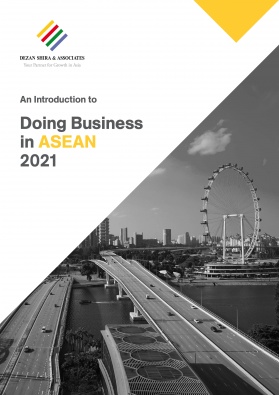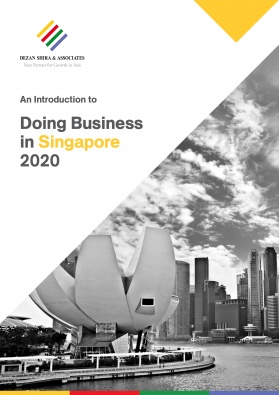The UK-Singapore Free Trade Agreement: Salient Features
- The UK-Singapore free trade agreement (FTA) was signed in early December 2020 and has been in effect since January 1, 2021.
- Singapore and the UK have annual trade worth over US$22 billion. This is the UK’s first FTA with a member of ASEAN.
- The UKSFTA mirrors the FTA Singapore signed with the EU, providing preferential tariffs and a reduction of non-tariff barriers in key sectors, such as electronics and pharmaceuticals.
- The UK will also grant Singapore enhanced access to bid for more UK government projects at the city and municipal level.
On December 10, 2020, the UK signed a free trade agreement (FTA) with Singapore (UKSFTA) and has been in effect since January 1, 2021.
Total trade between the UK and Singapore is worth over US$22 billion; the FTA will be the first such agreement with a member of ASEAN. The UK is also Singapore’s third and second-largest trading partner for goods and services respectively.
The UKSFTA largely mirrors the FTA between Singapore and the EU (EUSFTA) and covers the trade in goods — including provisions on preferential tariffs and rules of origin — trade in services, intellectual property (IP), and the reduction of non-tariff barriers in key sectors, such as electronics and pharmaceuticals.Singapore has one of the most extensive FTA networks in the region, comprising of 13 bilateral and 11 regional FTAs. These include some of the largest combined trade agreements in the ASEAN-China, ASEAN-India, and ASEAN-Hong Kong trade blocs.
Through the FTA, UK businesses can better utilize Singapore’s capacity as a financial and trading hub to expand to the rest of ASEAN and the wider region. Over 5,000 British businesses are already operating in Singapore.
Furthermore, the UKSFTA serves as a steppingstone for the UK to join the Comprehensive and Progressive Agreement on Trans-Pacific Partnership (CPTPP), where Singapore is a member.
Foreign investors should seek the help of registered advisors to understand how they can benefit from the incentives covered under Singapore’s various FTAs.
Elimination of tariffs
The UKSFTA will eliminate tariffs for 84 percent of all tariff lines for Singapore exports to the UK. By November 2024, tariffs on all the remaining products will be eliminated (for selected meat and seafood produce, textiles, fruits, and consumer goods).
The FTA will also continue to provide liberal and flexible rules of origins (ROO) for key exports from both countries. This will benefit automobiles, chemicals, textiles, machinery, pharmaceuticals, and petrochemical products.
This will allow Singapore companies to enjoy enhanced market access for Asian food products produced in the city-state under flexible ROOs, such as prawn dumplings and spicy anchovies. Up to a combined 350 tons of these products can be exported annually to the UK. These processed food products will be required to meet specific qualifying operations requirements and will still be subjected to UK sanitary and phytosanitary requirements. Singapore will also continue to provide duty-free access for all UK products.
A reduction of non-tariff barriers
There will be a reduction of non-tariff barriers for key sectors. This includes reducing duplicative testing for electronics and recognizing the international standards for motor vehicle parts.
Both countries will certify systems for meat production so that the inspection of food processing plants or abattoirs for companies for exports will not be required. In addition, the UK will regard Singapore’s ‘good manufacturing practices’ in the production of active pharmaceutical ingredients equivalent to its own, making it easier for Singapore pharmaceutical companies to export its products.
Singapore’s pharmaceutical industry is fast becoming a key contributor to the development of its manufacturing sector as well as its economy.
The country’s pro-business environment and deep base of skilled talent have attracted some of the largest pharma firms in the world, and a thriving research and development landscape — eight of the world’s 10 largest pharma companies own production plants in Singapore.
There are currently more than 50 pharmaceutical manufacturing facilities in the country, enabling Singapore to become one of the few countries in the world that exports more pharmaceutical products (US$8.1 billion) than it imports (US$3.1 billion).
Enhanced intellectual copyrights
The UKSFTA enables companies from both countries to enjoy enhanced rights for copyrights and geographical indications.
Sourcing from the EU and ASEAN
As with the EUSFTA, the UKSFTA enables UK and Singapore companies to continue to use EU-27 materials and parts for exports to each other’s markets. Singapore companies can also use materials sourced from ASEAN member states under the ROO for exports to the UK.
Enhanced market access for service providers
The UKSFTA will enhance market access for service providers and create a level-playing field for businesses in each other’s markets. This will impact businesses in sectors ranging from engineering to hospitality to engineering and advertisement.
The financial services sector is expected to see the most impact, given London and Singapore’s status as global financial hubs. The UKSFTA will provide opportunities for existing UK Qualifying Full Banks (QFB) in Singapore to expand, such as the addition of new customer service locations.
Both countries will further discuss strengthening their financial cooperation this year, including through the UK-Singapore Financial Dialogue, which is held annually.
Government procurement opportunities
The UK will grant Singapore enhanced access to municipal-level and city-level government procurement opportunities, meaning companies can bid and invest in more government projects in Britain.
The financial services sector is set to benefit particularly in greater collaboration on cross-border know-your-customer (KYC) processes, skills development, cybersecurity, and green finance.
About Us
ASEAN Briefing is produced by Dezan Shira & Associates. The firm assists foreign investors throughout Asia and maintains offices throughout ASEAN, including in Singapore, Hanoi, Ho Chi Minh City and Jakarta. Please contact us at asia@dezshira.com or visit our website at www.dezshira.com.
- Previous Article Cambodia Issues Latest Round of Incentives for Businesses
- Next Article Brunei Launches Economic Blueprint: Salient Features







